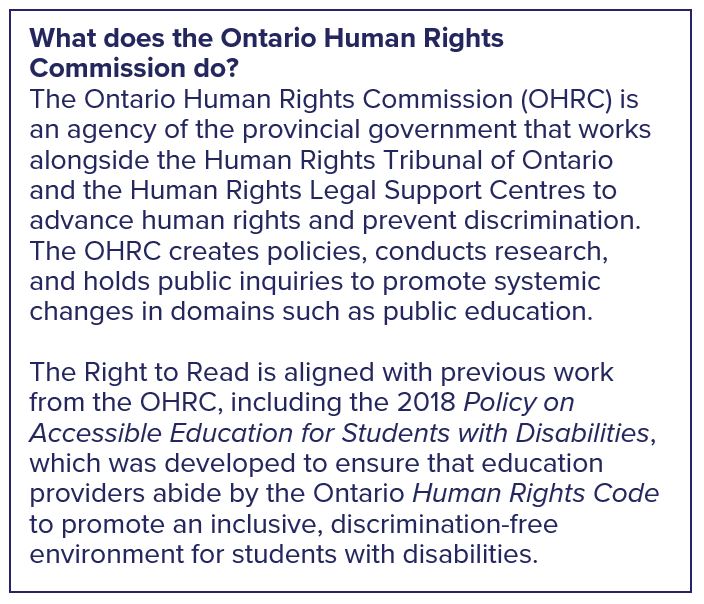Right to Read: OHRC launches public inquiry
The Right to Read
On October 3rd, the Ontario Human Rights Commission (OHRC) launched the Right to Read inquiry. It will examine possible human rights issues that may be affecting students with reading disabilities in Ontario’s public education system.
Parents, students, and educators in Ontario are invited to share their lived experience and insights into the barriers these students may face. The OHRC has also selected a representative group of eight public school boards in Ontario to assess how schools are ensuring that students with reading disabilities receive equitable support. Included in the inquiry will be things like teacher training, funding, accountability measures (e.g. assessment of student progress), data collection, and curriculum design.
The OHRC will be looking at potential human rights issues related to five areas of support:
- Universal Design for Learning (UDL): Are schools using an approach that uses multiple educational strategies to reduce barriers to learning?
- Mandatory early screening: Are students screened for reading difficulties when they first start school in kindergarten or Grade 1?
- Evidence-based reading intervention programs: Do students who have been identified with reading difficulties have access to reading programs?
- Accommodations: Do all students who have been identified with reading disabilities have access to educational supports or assistive technologies?
- Psycho-educational assessments: Where required beyond early screening, are timely and appropriate psycho-educational assessments available to all students?
Assessment wait times may be a barrier to the right to read
The Right to Read is part of a larger conversation around special education and access to resources in Ontario.
More than half of students in Ontario receive special education support without a formal identification; and there are a number of researchers who think it’s important that schools focus on all students who experience a range of difficulties with reading, not only students who are identified with reading disabilities. However, in Ontario, for a student to have a legal right to specialized special education support, they first need to be identified as having a learning disability. In the case of the Right to Read Inquiry, this would mean a disability that affects reading.
The Identification, Placement, and Review Committee (IPRC) process identifies exceptional pupils across five categories established by the Education Act—behavioural, communication, intellectual, physical and multiple—where “reading disabilities” is a sub-category within communication learning disabilities. Long wait times and limited access to resources for assessment can, however, impede this identification process.
People for Education’s Annual Ontario School Survey (2019) reported that 94% of elementary schools and 81% of secondary schools have students on waiting lists for professional assessments. Compounding the long wait times, 60% of elementary schools and 53% of secondary schools report restrictions on the number of special education assessments each year.
As described by the OHRC, barriers to timely and appropriate psycho-educational assessments are potential human rights issues affecting students with reading difficulties in Ontario.
“The promise of inclusive education continues to be elusive for many students with disabilities. Learning to read is fundamental for all students and yet the supports, appropriate accommodations, and timely identification are often lacking.”– Robert Lattanzio, the Executive Director of ARCH Disability Law Centre
What’s next for the OHRC inquiry?
The goal of the Ontario Human Rights Commission (OHRC)’s public inquiry is to ensure that students with reading disabilities have access to an education as outlined by the Ontario Education Act, “[the] purpose of education is to provide students with the opportunity to realize their potential and develop into highly skilled, knowledgeable, caring citizens who contribute to their society.”
For this public inquiry, the OHRC has the power to request information, question individuals (subject only to the person’s right to counsel), and learn from stakeholders and experts. The public inquiry is expected to be completed in 2020 and will result in a publicly-available report with a summary of the process, findings and recommendations.
Further information:
Ontario Human Rights Commission
Policy on Accessible Education for Students with Disabilities
